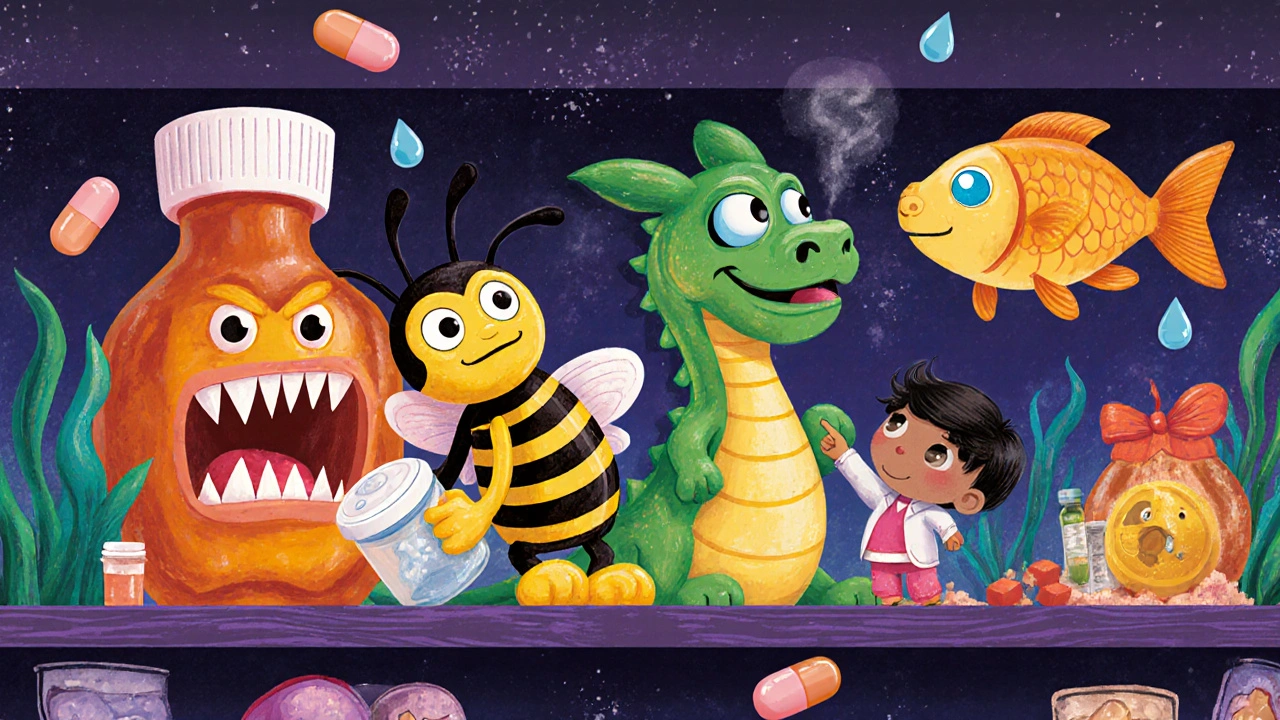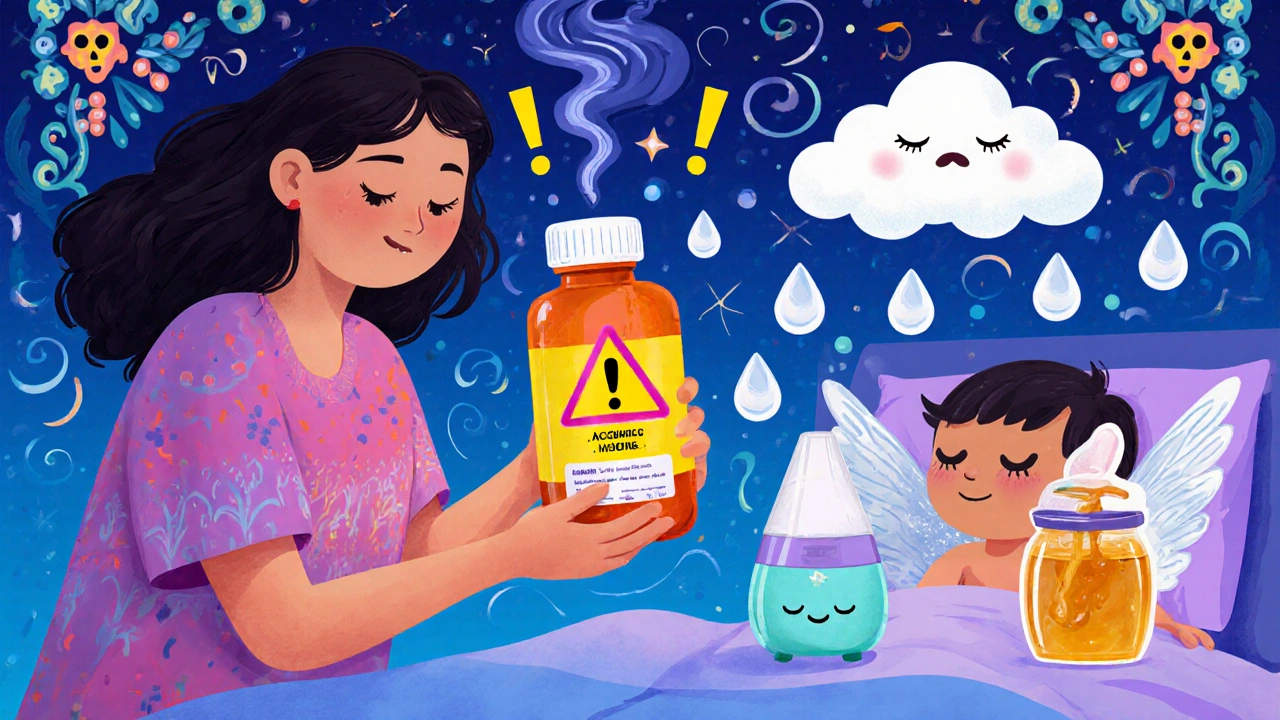Every parent has been there: your child is coughing, congested, and can’t sleep. You reach for the medicine cabinet, grab a bottle labeled "Children’s Cold Relief," and give it to them-thinking you’re helping. But here’s the hard truth: cough and cold medicines for kids under 6 don’t work the way you think they do-and they can be dangerous.
Why These Medicines Don’t Work for Young Kids
Over-the-counter cough and cold products are filled with ingredients like dextromethorphan, pseudoephedrine, chlorpheniramine, and guaifenesin. These were designed for adults, not tiny bodies. Young children, especially under 2, don’t have the liver enzymes needed to break these chemicals down safely. Studies show that kids under two have only 23% of the adult enzyme activity required to process dextromethorphan. That means even a "correct" dose can build up in their system and cause serious harm. The U.S. Food and Drug Administration (FDA) looked at over 30 years of data and found 123 deaths linked to these medicines in children under 2. Thousands more ended up in emergency rooms with symptoms like rapid heartbeat, seizures, and trouble breathing. In 2007, the FDA warned that there’s no proof these drugs help kids under 6-and plenty of proof they can hurt them. The American Academy of Pediatrics, the CDC, the Mayo Clinic, and the American Academy of Family Physicians all agree: cough and cold medicines are not recommended for children under 6. Not because they’re being overly cautious. Because the science is clear.The Real Risks: More Than Just Side Effects
It’s not just about overdosing. Many parents don’t realize that cold medicines often contain the same active ingredients as pain relievers. For example, some children’s cold syrups include acetaminophen. If you give your child Tylenol for a fever and then a cold medicine with acetaminophen on top, you’re doubling the dose. That’s how liver damage happens. Another big problem? Mixing products. A parent gives a cough suppressant, then a nasal decongestant, then a nighttime formula-all because they think "more is better." But these products stack up. One 2015 study found that 67% of medication errors in kids under 6 came from giving too many products at once. And 32% of those errors happened because parents used kitchen spoons instead of the measuring cup that came with the medicine. A teaspoon isn’t a tablespoon. A tablespoon isn’t a medicine dropper. And in a child’s body, those tiny differences matter. Even "natural" or "herbal" cold remedies aren’t always safe. Some contain ingredients like ephedra or licorice root, which can raise blood pressure or trigger seizures in young kids. And don’t assume that because a product says "for kids" it’s safe. The FDA found in 2021 that 22% of children’s cold products still didn’t have clear "do not use under 4" labels.
What Parents Are Still Doing Wrong
Despite all the warnings, a 2022 survey of 642 parents found that 42% still gave OTC cold medicine to their kids under 6. Why? Because they thought it would make their child feel better faster. That’s understandable. But the truth is, these medicines don’t shorten illness. They don’t reduce coughing more than water or rest. And they definitely don’t help kids sleep better-some even make them hyperactive. One parent on Reddit shared that after giving their 3-year-old Children’s Dimetapp, their child was wide awake for 12 hours, pacing and screaming. That’s not an isolated story. Antihistamines in these products can cause agitation, hallucinations, and erratic behavior in toddlers. One child was hospitalized after taking a cold medicine that contained phenylephrine-a decongestant that can spike blood pressure dangerously in small bodies. And then there’s the adult medicine trap. Walgreens customer reviews show that 38% of parents admitted to using adult cold pills when they couldn’t find the children’s version. That’s terrifying. An adult dose of pseudoephedrine can be lethal for a 2-year-old. The FDA says clearly: Never give a child medicine made for adults.What Actually Works: Safe, Proven Alternatives
So what do you do when your child is sick? Skip the medicine cabinet and try these evidence-backed, safe methods:- For babies under 6 months: Use saline nasal drops and a bulb syringe to clear their nose. Run a cool-mist humidifier in their room. Keep them hydrated with breast milk or formula. Avoid all OTC meds.
- For babies 6 months to 2 years: If they have a fever or pain, use acetaminophen (10-15 mg per kg of body weight) every 4-6 hours, no more than 5 doses in 24 hours. Never use ibuprofen under 6 months.
- For kids 1 year and older: One teaspoon of honey before bed can be more effective than any cough syrup. Honey coats the throat, thins mucus, and reduces nighttime coughing. A 2023 study from the American College of Chest Physicians says honey should be the first-line treatment for cough in children over 1.
- For all ages: Offer extra fluids-water, broth, ice chips. Elevate the head of their crib or bed slightly to help with breathing. Use a cool-mist humidifier (not warm mist-it can make congestion worse). Keep the room well-ventilated and avoid smoke or strong scents.

When to Call the Doctor
Most colds are harmless and go away in 7-10 days. But watch for these red flags:- Difficulty breathing or fast breathing
- Fever over 102°F (39°C) that lasts more than 3 days
- Cough lasting longer than 2 weeks
- Refusing to drink or signs of dehydration (dry mouth, no tears, fewer wet diapers)
- Lethargy, extreme irritability, or confusion
- Blue lips or fingernails
How to Avoid Future Mistakes
Here’s how to keep your child safe:- Always read the label. Look for "Do not use in children under 4" or "Under 6: Ask your doctor." If it doesn’t say that, don’t use it.
- Use only the measuring device that comes with the medicine. Never use a kitchen spoon.
- Write down what you give, when, and how much. Keep a log.
- Never combine cold medicine with another product that has acetaminophen or ibuprofen.
- Store all medicine out of reach and locked up. Toddlers can climb, open cabinets, and swallow anything.
- Ask your pediatrician before giving any new medicine-even if it’s "just a little."
There’s no magic pill for a cold. But there are safe, smart ways to help your child feel better. And avoiding unnecessary medicine isn’t just about safety-it’s about trusting your instincts and your child’s body to heal.
Can I give my 3-year-old children’s cough medicine if I use half the dose?
No. Children’s medicine isn’t just a smaller version of adult medicine-it’s formulated differently. Even half a dose can be too much for a young child. Their bodies can’t process the chemicals safely, and there’s no evidence it helps. Stick to non-medicine options like honey, saline drops, and humidifiers.
Is honey safe for babies under 1 year?
No. Honey can contain spores of botulism, which can cause life-threatening paralysis in infants under 12 months. Never give honey to a baby under 1 year, even in small amounts. For babies, use saline drops and suctioning instead.
Why do pharmacies still sell these medicines if they’re unsafe?
They’re still sold because they’re legal for older children and adults. But manufacturers are required to put clear warning labels: "Do not use in children under 4." Some products still don’t follow this rule. The FDA continues to monitor and update guidelines. The key is: don’t buy them for kids under 6. Choose safer alternatives instead.
What if my child’s doctor recommends a cold medicine?
Ask them why. Most pediatricians follow AAP and FDA guidelines and won’t recommend OTC cold meds for kids under 6. If your doctor does, ask for the specific reason-like a rare condition or asthma complication. Always double-check the dosage and ingredients. Never assume it’s safe just because a doctor said so.
Are natural remedies like vapor rub or essential oils safe?
Camphor and menthol in vapor rubs can be dangerous if applied to the nose or chest of young children-they can cause breathing problems. Essential oils like eucalyptus or peppermint are not safe for kids under 6 either. They can trigger seizures or airway irritation. Stick to saline, humidifiers, and honey (for kids over 1).
How long should a child’s cough last before I worry?
Most viral coughs last 1-3 weeks. If it’s still going after 2 weeks, gets worse, or is accompanied by wheezing, fever, or trouble breathing, see your doctor. A persistent cough could be asthma, whooping cough, or a secondary infection-not just a cold.
When your child is sick, your instinct is to fix it fast. But sometimes, the best thing you can do is wait-and help them through it with care, not chemicals. You know your child best. Trust that. And when in doubt, skip the medicine and call your pediatrician.

Conor McNamara
November 18, 2025 AT 14:03steffi walsh
November 20, 2025 AT 02:47Leilani O'Neill
November 20, 2025 AT 12:11Riohlo (Or Rio) Marie
November 21, 2025 AT 08:38Brenda Kuter
November 23, 2025 AT 03:26Shaun Barratt
November 24, 2025 AT 14:34Iska Ede
November 25, 2025 AT 08:05Gabriella Jayne Bosticco
November 27, 2025 AT 07:42Sarah Frey
November 27, 2025 AT 23:05Katelyn Sykes
November 28, 2025 AT 05:02Gabe Solack
November 29, 2025 AT 13:41Yash Nair
November 29, 2025 AT 20:42Bailey Sheppard
November 30, 2025 AT 03:30